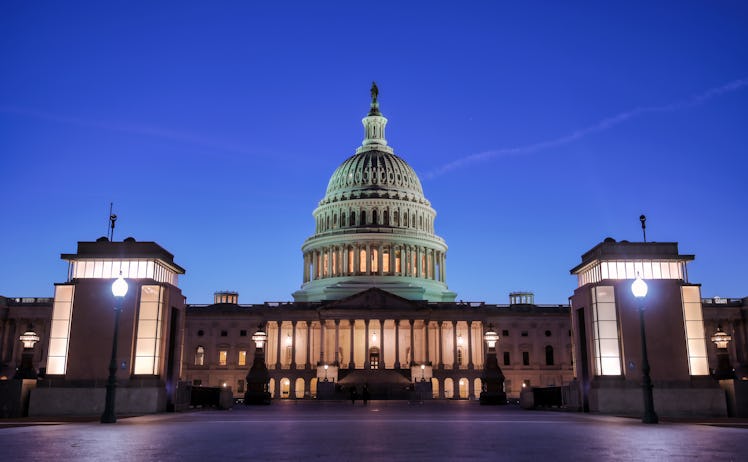
Congressional Staffers Are Starting To Unionize — Here's Why It's *Huge*
Remember, kids, there’s no such thing as a dream job!
While being a member of Congress may seem like a cushy gig, being a congressional staffer is another matter altogether. Although they tend to work longer hours than their executive branch counterparts, congressional staffers typically get paid less — a lot less, according to the Congressional Workers Union. However, things may be about to change: congressional staffers are unionizing in a huge move to build a better work environment, and they’ve got plenty of support from members of Congress to help them along.
“Today is a historic day,” the Congressional Workers Union wrote in a July 18 tweet. “The staffers of eight House offices take the first step towards unionizing their offices on the first day our right to bargain collectively is protected!” After filing the paperwork needed to become an official labor organization, the union filed petitions for representation at the Office of Congressional Workplace Rights under several members of the House — including Reps. Cori Bush, Chuy García, Ro Khanna, Andy Levin, Ted Lieu, Ilhan Omar, and Melanie Stansbury, all of whom released statements in support of their staffers’ unionization efforts.
While Rep. Alexandria Ocasio-Cortez didn’t immediately respond to Elite Daily’s request for comment, she has previously released statements in support of a staffers’ union. “On Capitol Hill, interns are often unpaid, many staffers don’t make a living wage, and lack of work protections can pave the way for unhealthy environments,” she wrote in a Feb. 3 tweet. “Sounds like a perfect place for a union.”
Some of the offices are also committing to working with their newly-unionized employees. “I strongly support the rights of Congressional workers who are choosing to take this important and courageous step, and I look forward to working with my staff however they choose to move forward,” García wrote in a July 18 tweet. “There’s power in a union, and all workers deserve the right to fight for respect and dignity on the job.”
According to the Congressional Workers Union’s site, they’ve got more than a few grievances to address when it comes to bargaining: The union says it’s common for staffers to work 12 to 14 hour days, which often extend well into the evening, with little to no pay equity. The union is also specifically working toward settling what they say are pervasive issues within the workplace, including “insufficient compensation and benefits,” sexual and racial harassment, as well as “inconsistent office policies regarding overtime, paid leave, and COVID safety standards,” to name only a few.
According to Molly Reynolds, Ph.D., a senior fellow in governance studies at the Brookings Institution, the way congressional staffers are treated within the workplace has huge implications for the country as a whole. “Congress has really underinvested in itself,” she previously told Elite Daily. “It has fewer staff, [and] it doesn’t pay its staff as well as it should,” she adds. “That makes it hard for people, particularly for people who are not from independently wealthy backgrounds, to pursue long careers on Capitol Hill.” This means that historically underserved communities of color play a minimized role in the country’s legislative process — and a lack of diversity within the legislative process equates to a lack of laws serving diverse communities.
As of January 2022, around 13% of congressional aides are not making a living wage, per Roll Call. And while Congress itself is more culturally diverse than it’s ever been, staffers have remained “overwhelmingly white,” according to Politico: In fact, as of January 2021, the Senate only had two Black chiefs of staff, and just four Latinos. So it’s clear Congress has a long way to go when it comes to improving diversity.
This huge move was made possible by House Resolution 1096 (H. Res 1096), which took effect on July 18. The measure passed on May 11, and granted House employees with the legal protections needed to unionize and collectively bargain, according to Bloomberg Law. Levin, one of the representatives whose staff announced they’d organized, has sponsored the resolution since its inception, and wasn’t shy about voicing his support online. “I'm so proud of the staffers who made a historic move in seeking union recognition in 8 offices w/ 70+ workers in the House,” Levin wrote in a July 18 tweet. “I am humbled to have played a modest role in helping realize the hard work of congressional staff who fought to make this moment possible. Solidarity!”
The congressional union is the latest evidence for a growing enthusiasm for unionizing across several industries. In the past year, popular companies such as Starbucks, Amazon, Apple, and more have seen growing unionization efforts. As of July 2022 more than 180 Starbucks stores have unionized. Nor is the trend limited to front line workers: White-collar professionals like architects, and, clearly, congressional staffers, are also turning to unions.
While it’s clear union members have a lot of work to do moving forward, this move is still a huge step toward achieving workplace equity for congressional staffers. “We are bringing worker power and equitable conditions to one of the most powerful institutions in the world,” Saul Levin, climate policy organizer for Cori Bush, wrote in a July 18 tweet. “We are just getting started!”